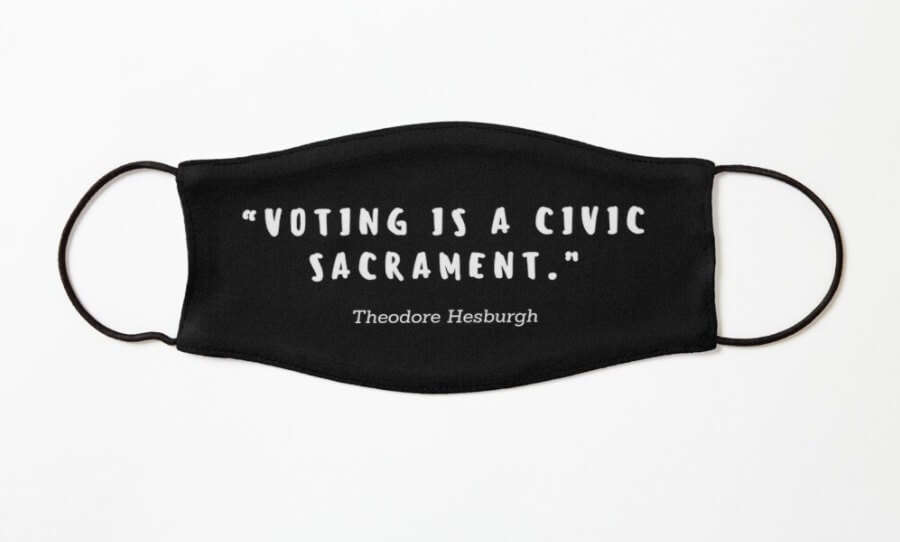Editor’s Note: Before the 2020 election, Robert Schmuhl reminded readers how Father Hesburgh used his public pulpit to preach the importance of voting. Schmuhl included his own nonpartisan, even anti-partisan, approach to evaluating candidates — a catechism for the electorate, now updated for the 2022 midterms.
Since the middle of the 19th century, the Tuesday after the first Monday in November of each even-numbered year is officially designated as Election Day. With so many close contests across the country this year, hazarding any predictions is a fool’s errand, but it’s a good bet that Rev. Theodore M. Hesburgh, CSC will receive some attention in political coverage before next Tuesday.
Years ago, the former Notre Dame president remarked, “Voting is a civic sacrament.” That seemingly simple five-word quotation has become something of a civic commandment. Columnists cite it; speakers recycle it. During the 2020 COVID-19 election season, the aphorism even appeared imprinted on face masks.
Father Hesburgh, who passed away in 2015 at age 97, never took political sides in elections, but he always emphasized to students, alumni and others that there was a near-sacred quality to the secular act of casting a ballot and, more broadly, participating in the democratic process.
To a certain extent, Hesburgh’s life was its own civic testament to working across the partisan divide to resolve problems for a common, shared good. A pragmatist rather than an ideologue, he received 16 presidential appointments between 1954 and 2001.
Whether it was the Commission on Civil Rights — he was a member from its founding in 1957 and served as its chair from 1969 to 1972 — or the Select Commission on Immigration and Relief Policy, the priest answered calls from Republican and Democratic occupants of the White House.
Party played no role. The principle of serving for the sake of others did.

Above all, Hesburgh was an institutionalist, someone who especially believed in the presidency and its central role to the life of the nation.
His work on the Civil Right Commission involved establishing rapport with four different presidents — the first and last were Republicans, with two Democratic ones in between.
During an undergraduate class session in 2008, when he was invited to be a visiting speaker to discuss the presidents with whom he’d worked, Hesburgh singled out Dwight D. Eisenhower, a Republican, and Lyndon B. Johnson, a Democrat, for their valuable collaboration with the Commission.
Hesburgh’s most significant period of governmental service spanned the quarter-century between the mid-1950s to the early 1980s. Back then, the political climate was light years from today. Partisanship was less virulent, and polarization didn’t exert its current, near debilitating, potency.
It’s legitimate, even intriguing, to wonder how a devout institutionalist might fare in the contemporary political environment. Would the us vs. them tribalism that makes consensus-building so arduous preclude a consensus-builder, like Hesburgh, from participating in Washington’s work today? Actually, when you think about it, it’s difficult to identify any influential bipartisan or nonpartisan commission operating now in the nation’s capital.
Still, as Hesburgh told countless campus groups and classes, it’s vital to vote and to stay civically engaged. Failing to exercise the franchise weakens democracy, he’d say.
During nearly four decades of teaching Notre Dame students about American politics and the media’s role in our public life, I developed an informal checklist of questions for someone to consider before casting a ballot. The approach, if anything, is nonpartisan, even “anti-partisan,” with a tight focus on the individual candidates: their background, experience, qualities, objectives, and all the rest.
In the recently published book, The Glory and the Burden: The American Presidency from the New Deal to the Present, I sketch out some questions related to specific themes. They are in no particular order, but have a certain consistency by beginning with the letter “c” — as in “civic.” Some concerns we all need to ponder:
Credibility — Is a candidate making statements based on accurate information, so that an argument on behalf of a policy proposal has a strong, reliable foundation on which to build a government initiative or program?
Character — Is a candidate’s biography a reflection of the life and work of someone who merits civic trust and confidence on judgments affecting matters of consequence, especially for the future?
Courage/Conviction — Is a candidate of sufficient strength of spine to make agonizing decisions and to see them either to their conclusion or to their modification, should serious problems arise?
Curiosity — Is a candidate inquisitive enough about other peoples, cultures, programs and history, such that any involved questions surrounding a complicated problem will receive interpretation based on due diligence — and due intelligence?
Creativity — Is a candidate able to address and evaluate a dilemma or dispute innovatively, demonstrating an ability to think and act without restrictions that might come from an existing yet narrow framework, possibly in need of a new appraisal?
Strict, knee-jerk partisanship won’t result in the consensus and compromise — a couple more civic “Cs” — that seem so essential in dealing with thorny contemporary problems.
In the pre-polarized and less tribal America that Hesburgh devoted himself to improving, voting possessed a quasi-sacramental dimension that he unfailingly championed. His five words still echo and carry as much meaning in 2022 as they did in previous election years. Maybe even more so.
Bob Schmuhl is the Walter H. Annenberg-Edmund P. Joyce Professor Emeritus of American Studies and Journalism at Notre Dame. He’s the author of several books, including Fifty Years with Father Hesburgh: On and Off the Record and The Glory and the Burden: The American Presidency from the New Deal to the Present (both published by Notre Dame Press).